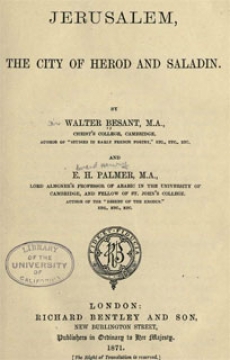| CHAPTER I
INTRODUCTORY
IT is our object to write a book which may serve as a historical account, complete so far as it goes, of the principal events with which Jerusalem is concerned, from the time when its history, as connected with the Bible, ceases, till the present ; that is to say, from the year A.D. 33 downwards. But it is difficult to take up the thread of the story at this date, and we are forced either to go as far back as Herod the Great, or to begin our narrative with the events which preceded the siege of Jerusalem by Titus. No date seems to us more ready to our hand than that of the death of Herod Agrippa. Even then we may seem beginning to tell a thrice told tale. The revolt of the Jews, their defeat of Cestius, the siege of Titus, are surely, it may be objected, too well known to require telling again. They are not well known, though they have been told again and again, and told with ten times the force, the vigour, the originality which we can put into these pages. But they are told here again because our central figure is Jerusalem. We have to show her first, in all her pride, the joy of the Jews, the visible mark of their greatness ; and then we have to follow her through two thousand years of varying fortune, always before the eyes of the world,-always the object of tender pity and reverence, always the centre of some conflict, the scene of some religious contention. Frequent as were the sieges of the city in the oldea days, they have been more frequent since. Titus took Jerusalem, Barcochebas took it, Julius Severus took it, Chosroes, Heraclius, Omar, the Charezmians, Godfrey, Saladin, Frederick, all took it by turns, all after hard fighting, and with much slaughter.
There is not a stone in the city but has been reddened with human blood ; not a spot but where some hand-tohand conflict has taken place; not an old wall but has echoed back the shrieks of despairing women. Jew, Pagan, Christian, Mohammedan, each has had his turn of triumph, occupation, and defeat ; and were all those ancient cemeteries outside the city emptied of their bones, it would be hard to tell whether Jew, or Pagan, or Christian, or Mohammedan would prevail. For Jerusalem has been the representative sacred place of the world ; there has been none other like unto it, or equal to it, or shall be, while the world lasts ; so long as men go on believing that
one spot in the world is more sacred than another, because things of sacred interest have been done there, so long Jerusalem will continue the Holy City. That this belief has been one of the misfortunes of the human race, one of the foremost causes of superstition, some of the pages which follow may perhaps help to show. But, in our capacity as narrators only, let us agree to think and talk of the city apart, as much as may be, from its sacred associations, as well as from its ecclesiastical history… |
